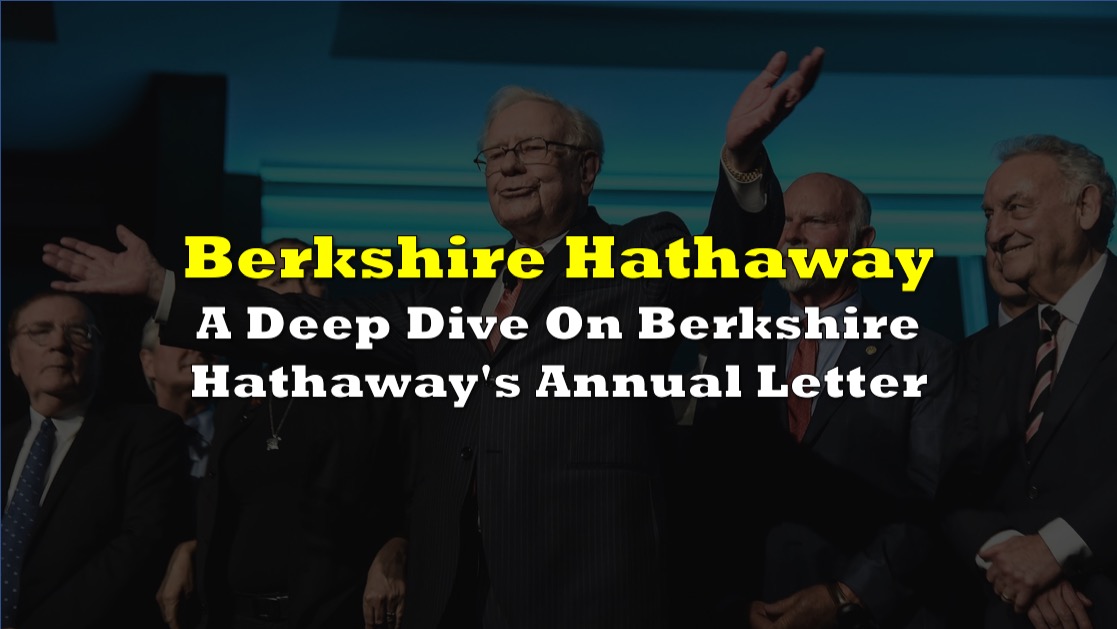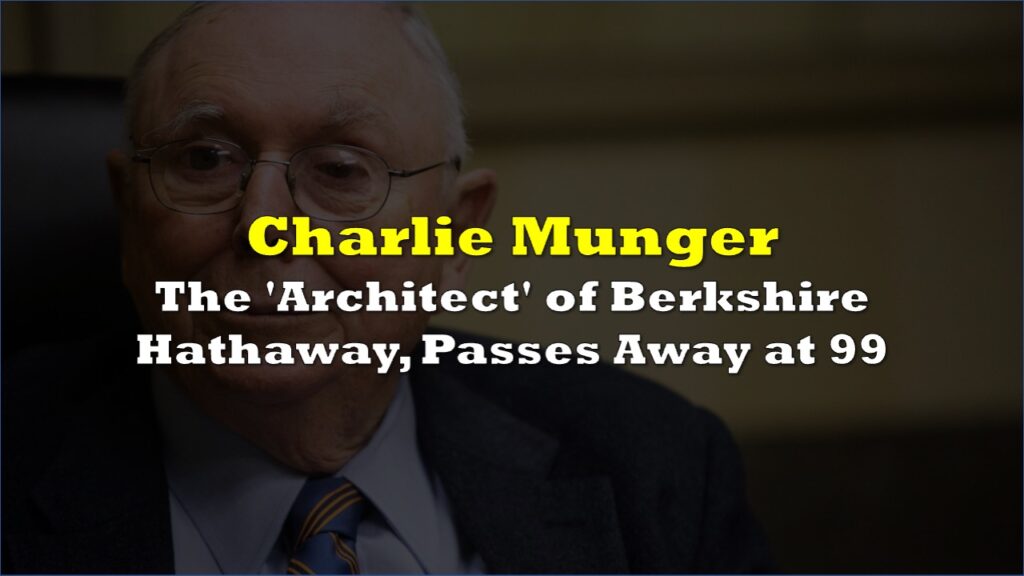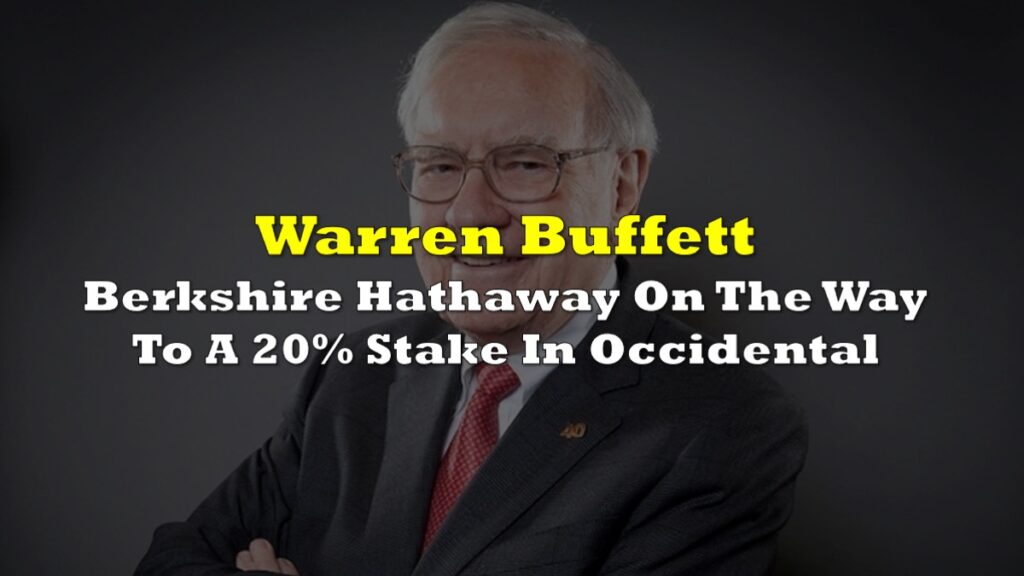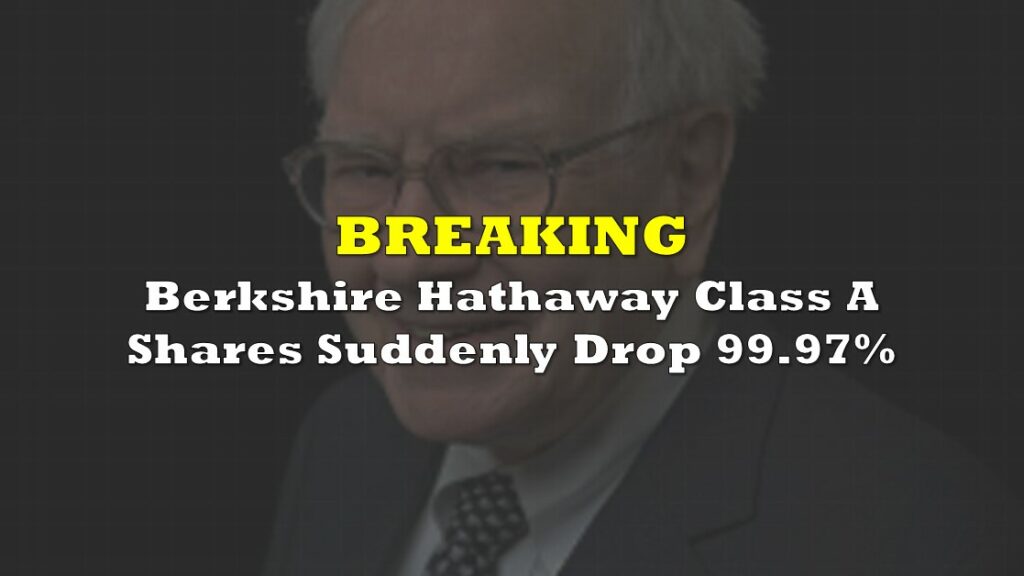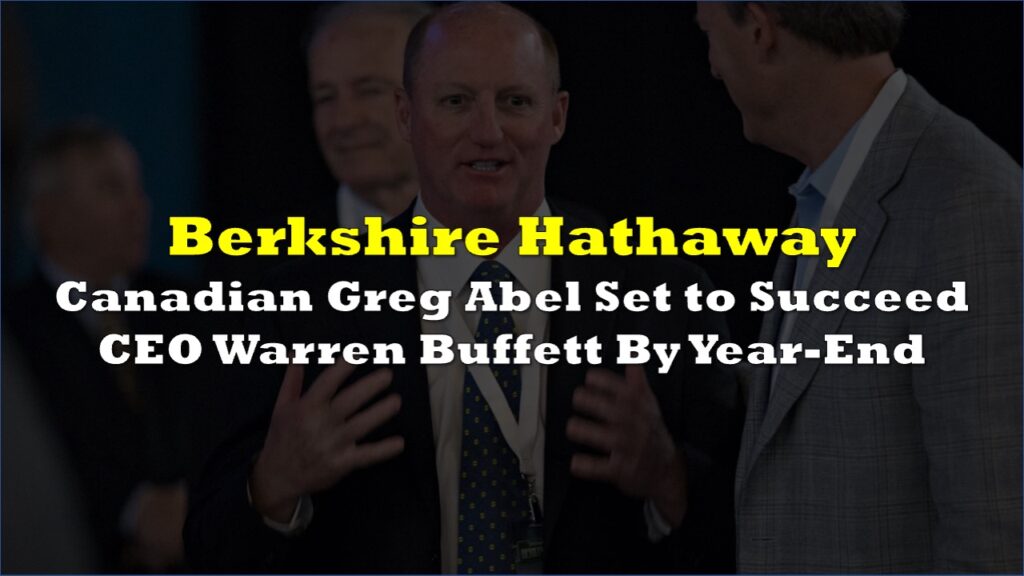Warren Buffett, the Chairman and CEO of Berkshire Hathaway (NYSE: BRK.B), recently provided insight into the company’s strategies, challenges, and long-term investments in the firm’s traditional annual shareholder letter.
A significant focus of the letter was on Charlie Munger, Buffett’s long-time partner in managing Berkshire, who passed away recently. Munger, echoing Buffett’s sentiment, underscored the importance of fulfilling their responsibilities to Berkshire shareholders, emphasizing transparency and accountability in communication.
“Berkshire has become a great company. Though I have long been in charge of the construction crew; Charlie should forever be credited with being the architect,” Buffett wrote of Munger.
Charlie Munger
Munger passed away just shy of his 100th birthday. Born and raised in Omaha, Munger spent the majority of his life beyond his hometown, leaving an mark on the world of finance and investment.
Munger’s path crossed with Buffett in 1959 when he was 35 years old, marking the beginning of a transformative partnership. In 1962, Munger delved into money management, setting the stage for a legendary collaboration in the years to come.
One of Munger’s significant contributions came in 1965 when he advised Buffett to shift his focus towards acquiring “wonderful businesses at fair prices,” diverging from the principles of their shared mentor, Ben Graham. Despite not having investments in Buffett’s partnership or expecting ownership of Berkshire stock, Munger’s guidance reshaped Buffett’s investment strategy, setting the stage for Berkshire’s remarkable growth.
Over time, Munger became Buffett’s partner in running Berkshire Hathaway, playing a pivotal role in steering the company away from old habits towards unprecedented success. Buffett himself credits Munger as the true architect of Berkshire Hathaway, likening their relationship to that of an older brother or loving father.
“Charlie never sought to take credit for his role as creator but instead let me take the bows and receive the accolades,” he said. “Even when he knew he was right, he gave me the reins, and when I blundered he never – never – reminded me of my mistake.”
Bertie
Further down the letter, Buffett introduced his sister, Bertie, as his mental model for Berkshire shareholders. Bertie, symbolizing long-term investors, embodies wisdom, sensibility, and an understanding of business news without needing to be an economic expert. Buffett highlighted the importance of catering to investors like Bertie, who trust Berkshire with their savings.
“Bertie understands the power – for good or bad – of incentives, the weaknesses of humans, the ‘tells’ that can be recognized when observing human behavior. She knows who is ‘selling’ and who can be trusted. In short, she is nobody’s fool,” he said.
Buffett emphasized Berkshire’s preferred method of reporting earnings, focusing on operating earnings, which exclude unrealized capital gains or losses. This approach aims to provide shareholders with a more sensible evaluation of the business’s performance over time.
Central to Berkshire’s strategy is the significance of capital gains in its value accretion strategy. Buffett reiterated the company’s goal of owning businesses with enduring good economics capable of deploying capital at high returns, acknowledging the challenges in predicting business winners and the importance of capable and trustworthy managers.
However, Berkshire’s size poses limitations on the number of meaningful investment opportunities, particularly within the U.S., with few options available outside the country.
“Outside the U.S., there are essentially no candidates that are meaningful options for capital deployment at Berkshire,” he added. “All in all, we have no possibility of eye-popping performance.”
Berkshire’s cash hoard jumped to a record at $167.6bn in Q4 as Warren Buffett struggled to find deals at attractive valuations: “There remain only a handful of companies in this country capable of truly moving the needle at Berkshire, and they have been endlessly picked over by… pic.twitter.com/CV35A55x1s
— Holger Zschaepitz (@Schuldensuehner) February 25, 2024
The letter also highlighted Berkshire’s long-duration investments, including positions in Coca-Cola, American Express, Occidental Petroleum, and five large Japanese companies. Buffett praised Occidental’s leadership under Vicki Hollub, particularly noting the company’s contributions to the favorable energy position of the U.S.
Buffett details "two other investments that we expect to maintain indefinitely":
— Julian Klymochko (@JulianKlymochko) February 24, 2024
Occidental Petroleum $OXY: although they own 27.8%, $BRK has no interest in acquiring it outright
5 Japanese trading houses: Itochu, Marubeni, Mitsubishi, Mitsui and Sumitomo pic.twitter.com/SyFBTY1cSn

Performance Relative To Outlook
At Berkshire Hathaway’s annual gathering on May 6, 2023, investors received a comprehensive overview of the company’s first-quarter performance and its outlook for the remainder of the year, which Buffett referenced when analyzing the years results.
The outlook for the full year brought both positive and negative projections. While most non-insurance businesses were expected to see lower earnings, exceptions were noted for stalwarts like BNSF and Berkshire Hathaway Energy (BHE).
Lastly, both the railroad (BNSF) and Utilities & energy (BHE) results sucked, and the outlook for utilities is bad due to "adverse developments in regulatory returns", which Buffett claims was a "costly mistake"
— Julian Klymochko (@JulianKlymochko) February 24, 2024
However, the insurance business is crushing it with record results pic.twitter.com/UACaE8SLM4
The company said that one bright spot in Berkshire’s financial landscape was the expected growth in investment income. This surge was attributed to increased returns from the company’s substantial U.S. Treasury bill position, providing a boost to overall revenue.
As anticipated, Berkshire’s insurance sector performed admirably, with strong underwriting earnings and bolstered property-casualty insurance prices contributing to its success.
However, not all sectors fared equally well. BNSF, considered essential to America’s economic infrastructure, faced significant challenges. Similarly, BHE experienced a setback, with severe earnings disappointment stemming from regulatory issues in certain states.
“When the dust settles, America’s power needs and the consequent capital expenditure will be staggering. I did not anticipate or even consider the adverse developments in regulatory returns
and, along with Berkshire’s two partners at BHE, I made a costly mistake in not doing so,” Buffet added.
Information for this story was found via the sources and companies mentioned. The author has no securities or affiliations related to the organizations discussed. Not a recommendation to buy or sell. Always do additional research and consult a professional before purchasing a security. The author holds no licenses.

